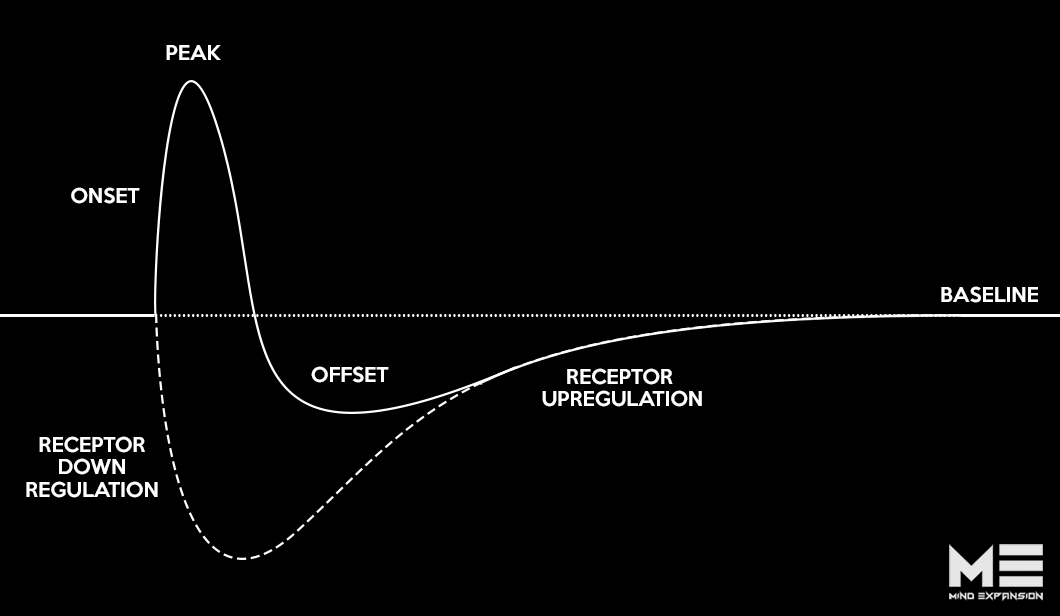Mind-Expansion
Greenlighter
- Joined
- Jan 13, 2018
- Messages
- 21
Hey guys,
With the following graphic I wanted to demonstrate the neuroadaptations of your body after administering a drug with regards to receptor up and downregulation.
Let's assume this drug is an amphetamine. Amphetamines exert their effects on dopamine receptors, which increase feelings of pleasure and motivation. They also exert their effects on adrenoreceptors, which increase feelings of alertness and energy. If you have never taken amphetamines before, your dopamine and adrenoreceptors are at baseline. Even if you only take the smallest dose of an amphetamine now, your body will be flooded with dopamine and adrenaline. And you'll be high as fuck. Unfortunately, your body doesn't care if that's good or bad. It senses an excess of dopamine and adrenaline, and as a result, it will downregulate its receptors. So after your high is over, you won't be feeling the way you felt before. You feel worse. You may even have enough dopamine in your system, but with a lack of receptors, the available dopamine can't fullil its job and you feel like shit. But thanks to homeostasis, your body also senses a lack of dopamine receptors in relation to the available dopamine, and as a result, it will upregulate its receptors again and after a while you will be back at baseline.
I also want to add that receptor downregulation is not the only cause of an unpleasurable comedown. In the case of amphetamines, your body also increases dopamine transporters (in order to get rid of excess dopamine) and decreases an enzyme called Tyrosinhydroxylase to prevent further synthesis of L-Dopa. Your body is an increadible adaptation machine and it has a lot if tricks to defend itself from the exposure of such potent chemicals.

With the following graphic I wanted to demonstrate the neuroadaptations of your body after administering a drug with regards to receptor up and downregulation.
Let's assume this drug is an amphetamine. Amphetamines exert their effects on dopamine receptors, which increase feelings of pleasure and motivation. They also exert their effects on adrenoreceptors, which increase feelings of alertness and energy. If you have never taken amphetamines before, your dopamine and adrenoreceptors are at baseline. Even if you only take the smallest dose of an amphetamine now, your body will be flooded with dopamine and adrenaline. And you'll be high as fuck. Unfortunately, your body doesn't care if that's good or bad. It senses an excess of dopamine and adrenaline, and as a result, it will downregulate its receptors. So after your high is over, you won't be feeling the way you felt before. You feel worse. You may even have enough dopamine in your system, but with a lack of receptors, the available dopamine can't fullil its job and you feel like shit. But thanks to homeostasis, your body also senses a lack of dopamine receptors in relation to the available dopamine, and as a result, it will upregulate its receptors again and after a while you will be back at baseline.
I also want to add that receptor downregulation is not the only cause of an unpleasurable comedown. In the case of amphetamines, your body also increases dopamine transporters (in order to get rid of excess dopamine) and decreases an enzyme called Tyrosinhydroxylase to prevent further synthesis of L-Dopa. Your body is an increadible adaptation machine and it has a lot if tricks to defend itself from the exposure of such potent chemicals.

